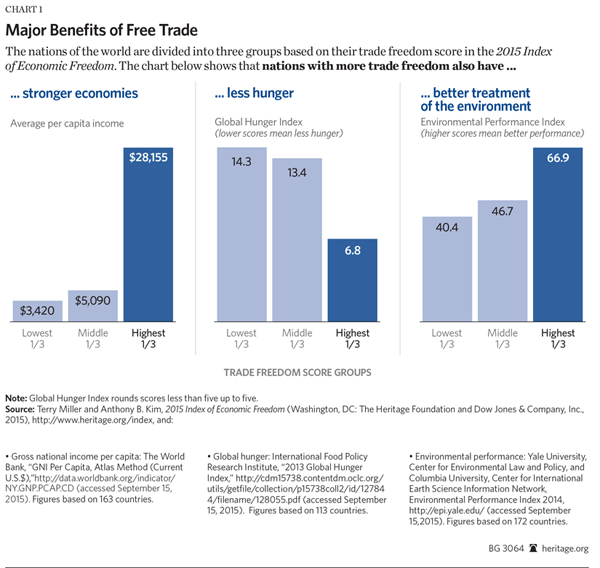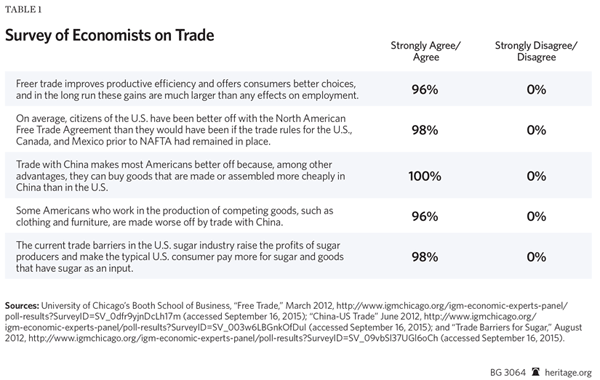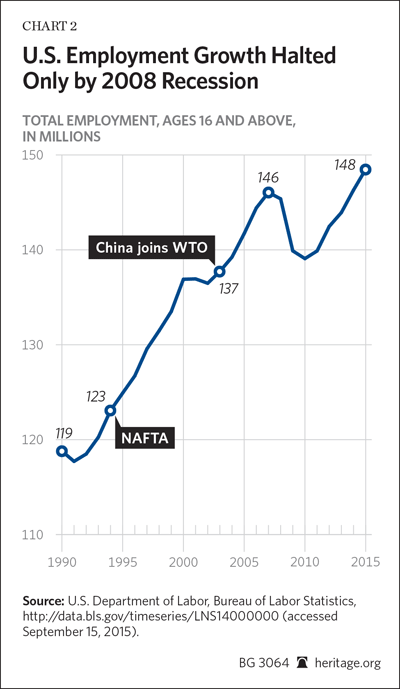Freedom to trade—the freedom to exchange goods and services openly with others—is as fundamental to human well-being as any right guaranteed in the U.S. Constitution. Indeed, the freedom to trade is the foundation of America’s modern economic system that provides historically unprecedented opportunities for individuals to achieve greater economic freedom and prosperity.
The process of economic specialization and trade, in which individuals focus on doing the things they do best, and then exchange the product of their labor with others who are likewise concentrating on their own areas of excellence, leads to much higher levels of production of goods and services as well as the most efficient use of labor and resources. It is this process that creates and sustains the markets of the “free market” system. The development of this system upended feudalism and brought about the dramatic and revolutionary improvements in living standards that characterize the modern age.
In other words, free and open trade has fueled vibrant competition, innovation, and economies of scale, allowing individuals and businesses to take advantage of lower prices and increased choice. As a result, billions of people around the world have escaped the constraints of subsistence farming and extreme poverty that characterized the lives of most of humanity throughout history.
As far as the fundamental right of individuals to decide for themselves how to work and how to spend their wages, it makes no difference whether the marketplace encompasses a village, a nation, or the world. No person—and no government—should have the right to dictate to another person where he must work. And no person or government, without compelling justification relating to health or public safety, should have the right to restrict the access of others to whatever goods and services they desire and can afford.
From the point of view of economic efficiency, the size of the market in which the individual can trade does matter: The larger, the better. Larger markets provide more choices and greater competition, and they permit economies of scale that promote the most efficient production processes. The United States was the first great free trade zone of the modern age, a fact that accounts for the economic efficiency and prosperity that made the U.S. the envy of the world.
The right to trade freely—as with the rights to life, liberty, and the pursuit of happiness proclaimed in the Declaration of Independence, and rights such as freedom of religion and freedom of speech guaranteed in the Constitution—is properly an individual right that government should act only to secure, not to impede. Yet, the freedom to trade, despite its moral underpinnings and manifest societal benefit, lacks constitutional specification, and throughout the history of this republic, there have always been those who sought to use the power of government to restrict others’ freedom to trade in order to enhance or preserve their own economic advantages.
Within U.S. borders, such restraints have taken the form of excise taxes, regulations, and barriers to entry such as licensing. At U.S. borders, such restraints include tariffs, qualitative restrictions, and quotas. Whether applied internally or at the border, the intent of such measures is the same: to reduce competitive pressure on existing firms. The impact, likewise, is the same: higher prices and reduced choices for consumers.

America Needs Free Trade
The impact of free trade on America is regularly the subject of contentious debate both on Capitol Hill and in the media. In general, the free trade argument plays out on two very distinct levels: On one level are the efforts by individual industries or firms to obtain special protection against foreign competition through tariffs or quotas, or occasionally through “safeguards” or other retaliatory actions permitted in trade agreements. Such protectionism can be quite lucrative for the industry or firms in question, which often lobby extravagantly to gain the benefit. Unfortunately, the cost is borne by the American public overall, which must pay higher prices and choose from a narrowed range of product options.
The second level at which trade is debated is much broader, involving issues such as exchange rates, environmental issues, and labor standards in foreign countries. At this level, those seeking “protection” are generally not seeking special favors in order to boost profits, but are seeking relief from the cost disadvantage imposed on them by burdensome regulations in the U.S. or differences in monetary policy between the U.S. and foreign governments. Broad groups, such as unions or environmental nongovernmental organizations, may join the battle to preserve and extend what they see as regulatory gains. While these motives may seem somewhat more “pure” than the rent-seeking lobbying of industries or firms, the end result of such government protectionist action is the same: narrow benefits for a special interest, higher prices and less consumer choice for all Americans, and a loss of overall economic efficiency.
Fundamentally, free trade is about rejecting favoritism and expanding economic opportunity for all. It is essential that policymakers and presidential hopefuls separate hype from fact and assess upcoming trade initiatives objectively. Armed with the facts, they can then help to promote dynamic economic growth and lasting prosperity in the U.S.
What Americans Need to Know About Free Trade
What Is Free Trade? Free trade occurs when the government does not limit or subsidize either imports or exports—meaning that Americans can spend their dollars on goods and services regardless of where they are from and engage without restriction in voluntary, mutually beneficial transactions, both as buyers and sellers, with people in other countries.
What Is Protectionism? “Protectionism” encompasses a range of laws and regulations through which politicians and bureaucrats in Washington, D.C., decide how Americans should spend their dollars. Tariffs (taxes), quotas (quantity limits), and subsidies (government spending) benefit politically powerful special interest groups. “Protecting” Americans by restricting their freedom to trade is often presented as a way of combatting “unfair” foreign practices. In fact, it is a process by which the government divides Americans into winners and losers based on their political influence.
What Do the Declaration of Independence and the Constitution Say About Free Trade? The Declaration of Independence accused the king of Great Britain of “cutting off our Trade with all parts of the world.” The Commerce Clause of the U.S. Constitution established a free trade zone between the states and prohibited export taxes.
What Is Better for the U.S.: Free Trade or Protection from Imports? According to data in the annual Index of Economic Freedom, countries with low trade barriers are more prosperous than those that restrict trade.

What Do Economists Say About Free Trade? Polls consistently show near-unanimous support for free trade from economists. According to a panel of economic experts questioned by the University of Chicago’s Booth School of International Business, “free trade improves productive efficiency and offers consumers better choices.” (See Table 1.)

What Do Americans Believe About Free Trade? According to a 2014 survey from the Chicago Council on Global Affairs, 65 percent of Americans believe that “globalization, especially the increasing connections of our economy with others around the world, is mostly good for the United States.”[1] A 2014 Pew Research Center survey found that 68 percent of Americans believe growing trade and business ties with other countries is “a good thing.”[2] A 2015 Pew survey found that 58 percent of Americans believe that trade agreements have been “a good thing” for the United States.[3]
What Does “Fair Trade” Mean? Politicians often talk about the need to support trade that is “free but fair.” Seldom, however, does anyone explain what fair trade is, or—even more to the point—for whom trade should be fair. In the name of fairness, different special interest groups advocate different protections for their specific industries and call the comparative advantage of other countries unfair. In reality, fair trade occurs whenever there is a voluntary transaction between a willing buyer and a willing seller.
Do Imports Destroy American Jobs? No credible economic study has ever documented net U.S. job losses resulting from imports. Trade—like technology—destroys some jobs but creates others. According to Heritage Foundation research, over half a million American jobs—in fields such as transportation, wholesale, retail, construction, and finance—are supported by imports of clothes and toys from China alone. The dollars that Americans save by importing products are spent and invested elsewhere in the U.S. economy, creating new jobs; the dollars that foreign businesses earn from selling their goods to Americans are spent on U.S. exports or invested in the U.S. economy, also creating new American jobs.
What About Critics Who Claim the U.S. Has Lost Millions of Jobs Due to the North American Free Trade Agreement (NAFTA) and Chinese Imports? The United States has gained millions of new jobs since NAFTA was created and since China joined the World Trade Organization (WTO) in December 2001. (See Chart 2.)

What Does a Trade Deficit Mean? The misleading phrase “trade deficit” implies that dollars are being drained from the U.S. economy. However, once all financial transactions, including foreign investment, are accounted for, the deficit vanishes. In 2014, for instance, Americans sent $4.4 trillion abroad by purchasing imports, investing in companies abroad, repaying foreign investors, or otherwise transferring dollars. In 2014, Americans also received $4.4 trillion from people and companies abroad that bought U.S. exports, invested in the U.S., paid U.S. investors, or otherwise transferred money. This is not just a fluke; it is an accounting identity that many people overlook.
Does a Growing Trade Deficit Mean More Unemployment? The trade deficit does not cause unemployment. For example, while imports to the United States and the U.S. trade deficit both decreased significantly from 2008 to 2009, the unemployment rate increased from 5.8 percent to 9.3 percent. From 2009 to 2014, imports to the United States and the trade deficit increased significantly, but the U.S. unemployment rate decreased from 9.3 percent to 6.2 percent. This is exactly the opposite of what would happen if bigger trade deficits caused more unemployment.
What Should the Government Do About Unfair Foreign Trade Practices? Some politicians suggest that if other countries subsidize their exports or restrict imports, the United States should do the same thing. President Ronald Reagan understood that the U.S. government should do what is best for the United States—not copy bad policies from other countries: “If one partner shoots a hole in the boat, does it make sense for the other one to shoot another hole in the boat? Some say, yes, and call that getting tough. Well, I call it stupid.”[4]
How Does Deficit Spending Affect Trade? In 2014, the federal government borrowed over $300 billion from abroad to finance its budget deficit. If treasury bonds were counted as an export, then “exports” of treasury bonds would have exceeded exports of U.S. farm products or cars. A dollar borrowed from abroad by the government is a dollar not available to buy U.S. exports or invest in the private sector of the U.S. economy.
What Is the Best Way to Address Foreign Trade Barriers? Free trade agreements, such as NAFTA, as well as the WTO reduce trade barriers in the United States and abroad. President Reagan had a response for those who think the United States should get tough on foreign governments by increasing U.S. trade barriers: “When you hear talk about a tough trade bill, remember that being tough on trade and commerce, the lifeblood of the economy, will have the worst possible consequences for the consumer and the American worker.”[5]
Is Outsourcing a Problem? Washington Post columnist Steven Pearlstein commented on the savings that result from outsourcing: “Those savings and those extra profits aren’t put under the mattress. Most of it is spent or invested in the United States in ways that are hard to track but have surely created hundreds of thousands of jobs in other companies and other industries.”[6] Indeed, income from Americans’ investments in other countries generated over $800 billion that flowed into the U.S. economy in 2014.[7] Americans also benefit greatly from insourcing: More than 5 million Americans owe their jobs to foreign direct investment.

How Do imports Affect U.S. Manufacturers? Over half of U.S. imports consist of capital goods and intermediate products, such as steel for carmakers and lumber for builders, which are the lifeblood of U.S. manufacturing. A 2013 study by the Federal Reserve Bank of St. Louis concluded that “imports have played a critical [and] positive role in boosting manufacturing output in the United States—much more so, in fact, than exports.”[8] U.S. imports and manufacturing output are both up more than 20 percent since the economy began to emerge from the recession in 2009.
How Do Imports Give American Consumers Greater Purchasing Power? Imports from America’s trading partners also allow U.S. consumers to buy a wider variety of goods at lower prices. This effect raises real wages and helps Americans purchase more with the same incomes. As recently noted by the Council of Economic Advisers, trade “is especially important for middle-class consumers.… [They] gain an estimated 29 percent of their purchasing power from trade…[and] the reduction in U.S. tariffs since World War II contributed an additional 7.3 percent to U.S. GDP, or approximately $1.3 trillion in 2014.”[9]
How Do U.S. Tariffs Affect the Economy? Protectionism is a self-imposed economic sanction, like the sanctions that the U.S. government imposes on other countries. For example, U.S. barriers that prevent North Koreans from buying foreign-made goods punish North Koreans, and U.S. barriers that prevent Americans from buying foreign-made goods similarly punish Americans. If someone in another country can produce a better or less-expensive product, Americans are better off when they are free to buy that product.
How do Free Trade Agreements Affect the United States? Good trade agreements increase economic freedom and prosperity by reducing trade barriers. They also encourage the government to play by the rules, provide a way for mediating trade and investment disputes, and prevent costly trade wars.
How Do Trade Agreements Affect U.S. Sovereignty? Trade agreements increase individual autonomy for Americans by reducing U.S. and foreign trade barriers. Free trade agreements have no impact on U.S. sovereignty because they cannot override U.S. law or the Constitution, and because the United States is free to leave any trade pact at any time.
Americans’ Freedom to Trade Must Be Protected
Free trade is undeniably a vital pillar of America’s economic strength. As Ronald Reagan once reminded his fellow citizens:
The winds and waters of commerce carry opportunities that help nations grow and bring citizens of the world closer together. Put simply, increased trade spells more jobs, higher earnings, better products, less inflation, and cooperation over confrontation. The freer the flow of world trade, the stronger the tides for economic progress and peace among nations.[10]
In the interest of the American public and economy, U.S. policymakers should heed these words.
—Bryan Riley is Jay Van Andel Senior Analyst in Trade Policy, and Anthony B. Kim is Research Manager of the Index of Economic Freedom and Senior Policy Analyst for Economic Freedom, in the Center for Trade and Economics, of the Institute for Economic Freedom and Opportunity, at The Heritage Foundation.



